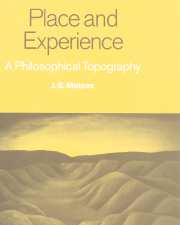Book contents
- Frontmatter
- Contents
- Acknowledgments
- Introduction: the influence of place
- 1 The obscurity of place
- 2 The structure of spatiality
- 3 Holism, content and self
- 4 Unity, locality and agency
- 5 Agency and objectivity
- 6 Self and the space of others
- 7 The unity and complexity of place
- 8 Place, past and person
- Conclusion: the place of philosophy
- Bibliography
- Index
3 - Holism, content and self
- Frontmatter
- Contents
- Acknowledgments
- Introduction: the influence of place
- 1 The obscurity of place
- 2 The structure of spatiality
- 3 Holism, content and self
- 4 Unity, locality and agency
- 5 Agency and objectivity
- 6 Self and the space of others
- 7 The unity and complexity of place
- 8 Place, past and person
- Conclusion: the place of philosophy
- Bibliography
- Index
Summary
[T]here must be, then, corresponding to the open unity of the world, an open and indefinite unity of subjectivity. Like the world's unity, that of the I is invoked rather than experienced each time I perform an act of perception, each time I reach a self-evident truth, and the universal I is the background against which these effulgent forms stand out: it is through one present thought that I achieve the unity of all my thoughts … The primary truth is indeed ‘I think’, but only provided that we understand thereby ‘I belong to myself’ while belonging to the world.
Maurice Merleau-Ponty, The Phenomenology of PerceptionThe idea of subjective space is tied to the idea of an experiencing creature around which such a space is organised. For a creature that has a grasp of the concept of subjective space – and a grasp of the concept of subjective space is necessary, as was seen earlier, to the grasp of the concept of objective space – the grasp of that concept must also be tied to the creature's grasp of its own self-identity and more specifically to the creature's grasp of the concept of itself. But what exactly is the relation between the concept of self or of subjectivity that is involved in a creature's grasp of subjective space and the idea of spatiality? One might ask the same question more generally of the relation between ideas of spatiality and the concepts of both subjectivity and objectivity.
- Type
- Chapter
- Information
- Place and ExperienceA Philosophical Topography, pp. 72 - 91Publisher: Cambridge University PressPrint publication year: 1999



